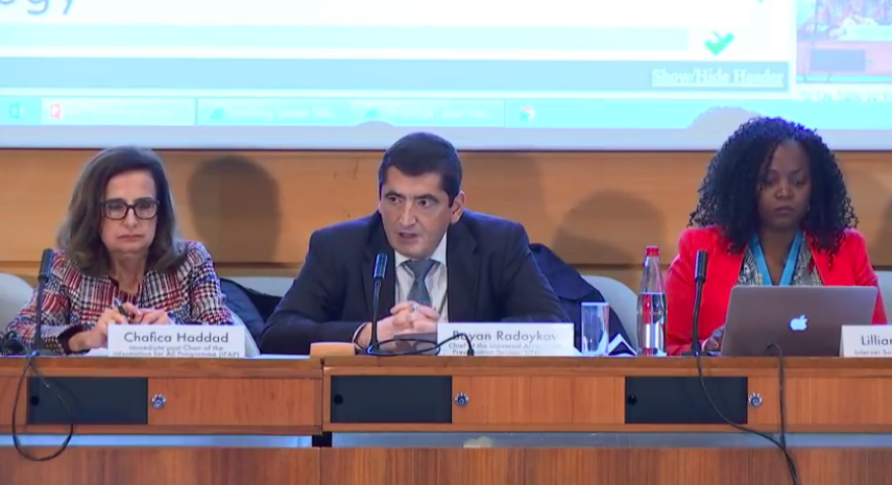
Setting the tone at the outset of the Internet Governance Forum Day 2 workshop “Preventing Youth from Online Violent Radicalisation”, moderator Boyan Radoykov of UNESCO acknowledged that addressing youth extremism is an “extremely challenging issue and extremely challenging work.” This reality was confirmed by the conversation that followed, which exposed the tensions between the growing threat of online radicalisation and the corresponding potential for violations of freedom of expression in the name of safety.
Chafica Haddad, immediate past chair of UNESCO's Information for All Programme (IFAP), opened the discussion by affirming UNESCO and IFAP's commitment to tackling this issue proactively. She called for civil society and nation states to do the same, emphasising the ethical stakes of an effective response. “Preventing violent extremism is a commitment and obligation under the principles and values enshrined in the charter of the UN, the Universal Declaration of Human Rights, and other international human rights instruments,” she insisted.
Divina Frau-Meigs, a researcher from the Université de la Sorbonne, classified online radicalisation as one of many contemporary “informational disorders”, before advocating for a paradigm shift from reactive regulatory approaches to long-term solutions aimed at youth empowerment and education. She explained the need to ensure that “media and information literacy is the counter-narrative, the one that is most holistic, the one that accompanies young people from very early stages at school and stays with them.” Giving young people the capacity to identify and resist online manipulation involves providing them with “critical knowledge” and tools which cannot be learned through “one-shot” initiatives, but must be embedded in educational curricula and public discourse. “You have to train young people who have been born with the internet to master it” rather than be subjected to it, she concluded.
Meanwhile, Mark Hecker from France's Institut francais des relations internationales (IFRI), a researcher of radicalisation processes both on and offline, identified the four main ways in which extremists make use of the internet: as a radical library to seek information, a recruitment tool, a communication hub and, lastly, a medium to plan attacks. The strategies being used to counter these tactics include law enforcement work, counter-messaging and removal from online platforms. He noted the relative success of these measures; the legal evidence used to prosecute terrorist activities is often gathered online, while counter-messaging strategies have been shown to act as effective deterrents provided they contain three key elements: “a good message, a good messenger and a good platform.” Efforts by online platforms such as Facebook and Google to remove extremist content have also made it “much harder for extremist organisations to reach a broad audience.” Concluding his intervention, however, he raised the dilemma which underpinned the session: “How can we find the right balance between safety or security on the one hand and the protection of civil liberties on the other hand?”
Drawing on her experiences in Uganda and Kenya, Lillian Nalwoga of the Internet Society of Uganda illustrated the difficulty of combating online manipulation in a context where many users are new to the internet, lack critical media skills and engage almost exclusively with social media platforms. Nalwoga, who also works with APC member organisation CIPESA, noted a government bias toward problematic criminalisation of online activities in the region, and called for a clearer, rights-based strategic framework, without which “the anti-terrorism laws that exist in some of these countries… become open to abuse.”
Finally, Saddem Jabeli of Net-Med Youth delved into the political and digital context of Tunisia, explaining the country's counter-narrative policy which involves a partnership between the government and civil society organisations. He stressed the importance of creating sustainable preventative initiatives, both strategically and operationally, through more flexible funding and organisational models. In terms of content, he called for the use of alternative narratives rather than counter-narratives, as a way to target vulnerable youth through positive messaging, such as “stories of young people from those regions who were able to demonstrate resilience.”
Rather than offering prescriptive solutions, the session exposed the nuances of this hot-button issue, which crosscuts technical, policy, legal and social debates and feeds into broader global political concerns. Though no clear consensus was reached, the workshop revealed both the value of pragmatic policy-based, legal and technical responses as well as the need for a more reflective conversation on youth empowerment, resilience and capacity building in the digital space. As Radoykov put it, although “this issue is extremely complex… I think we're on the right track.”